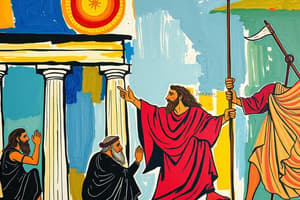Podcast
Questions and Answers
¿Cuál es la importancia de la mitología griega en la cultura clásica?
¿Cuál es la importancia de la mitología griega en la cultura clásica?
Ofrecen perspicaces ideas sobre la sociedad y creencias antiguas griegas.
¿Qué temas fundamentales destacan en la mitología griega?
¿Qué temas fundamentales destacan en la mitología griega?
Heroísmo, valentía y altruismo.
¿Quiénes eran algunos de los héroes mencionados en los mitos griegos?
¿Quiénes eran algunos de los héroes mencionados en los mitos griegos?
Achilles, Odysseus y Hercules.
¿Dónde residían los dioses principales del panteón griego?
¿Dónde residían los dioses principales del panteón griego?
¿Qué aspectos de la vida estaban bajo la responsabilidad de los dioses griegos?
¿Qué aspectos de la vida estaban bajo la responsabilidad de los dioses griegos?
¿Quiénes eran Poseidón y Atenea en la mitología griega?
¿Quiénes eran Poseidón y Atenea en la mitología griega?
¿Cuál fue el conflicto que desencadenó la Guerra de Troya en la mitología griega?
¿Cuál fue el conflicto que desencadenó la Guerra de Troya en la mitología griega?
¿Qué hazaña realizó Teseo en la mitología griega?
¿Qué hazaña realizó Teseo en la mitología griega?
¿Quién fue el héroe que mató a la Gorgona Medusa?
¿Quién fue el héroe que mató a la Gorgona Medusa?
¿Qué papel jugó Aquiles en la Guerra de Troya según la Ilíada de Homero?
¿Qué papel jugó Aquiles en la Guerra de Troya según la Ilíada de Homero?
Flashcards are hidden until you start studying
Study Notes
Unraveling Classical Culture through Greek Mythology
At the heart of classical culture, one finds the rich tapestry of Greek mythology, a vast and colorful collection of stories that have been passed down through centuries. These narratives, often entwined with religion, philosophy, and art, offer captivating insights into ancient Greek society and its beliefs. Let's delve into a few of these myths and their significance in the grand tapestry of classical culture.
Origins and Their Significance
Greek mythology originated from various sources, including religious rituals, epics, and poetry. It served as a medium to explain the origins of nature, human behavior, and the world itself. Most myths were developed around gods and heroes, who were seen as reflections of both idealized virtues and human flaws.
A fundamental aspect of Greek mythology is its emphasis on heroism, bravery, and selflessness. The tales of Achilles, Odysseus, and Hercules, among others, have inspired countless artists, authors, and philosophers throughout history, displaying the cultural significance of these myths.
The Gods and Their Stories
The Greek pantheon comprised an impressive number of gods, each responsible for various aspects of life. The Olympians, the supreme gods, resided atop Mount Olympus, where they oversaw the world beneath them. Zeus, the king of gods, was the god of sky and thunder, while Hera, his wife, was the goddess of marriage and women. Poseidon, the god of the sea, and Athena, the goddess of wisdom and warfare, were among the most prominent Olympians.
Many myths revolve around the gods and their interactions with one another, with the most famous example being the Trojan War, a conflict sparked by the abduction of Helen, a Spartan princess, by Paris, a Trojan prince. The gods themselves became involved in the conflict, as they favored either the Greeks or the Trojans.
Greek Heroes and Their Deeds
The heroic tales of Greek mythology often intertwine with the lives of the gods. The myth of Theseus, for example, details how the Athenian hero fought the Minotaur, a half-bull, half-human creature, in the Labyrinth of Crete. The story of Perseus, on the other hand, recounts how the hero slew the Gorgon Medusa.
Achilles, the greatest warrior of the Trojan War, was a paradigm of heroism. In the Iliad, a foundational epic poem by Homer, Achilles's wrath played a pivotal role in the conflict. His story demonstrates the duality of the human condition, where the heroic and the tragic coexist.
The Art and Literature of Mythology
Greek mythology not only provided narratives but also inspired artistic expressions in various forms. From monumental sculptures to intricate pottery, mythology permeated the art of ancient Greece. The Parthenon, for instance, features reliefs depicting scenes from the life of Athena, the patron goddess of Athens.
Literature, too, was invaluable in propagating mythology. The Iliad and the Odyssey, two of the most famous works of Greek literature, are both epics that tell the tales of the Trojan War and Odysseus's adventures, respectively. These works, along with other poems and plays, served as the basis for the development of Western literature.
Conclusion
Greek mythology is a treasure trove of stories that illuminate the classical culture of ancient Greece. The narratives of gods, heroes, and villains offer a glimpse into the values, beliefs, and ideals of the time. By examining these myths, we can better understand the complexity of ancient Greek society and its lasting impact on the world. The rich tapestry of Greek mythology continues to inspire artists, authors, and scholars alike, offering endless opportunities for exploration and enrichment.
Studying That Suits You
Use AI to generate personalized quizzes and flashcards to suit your learning preferences.




